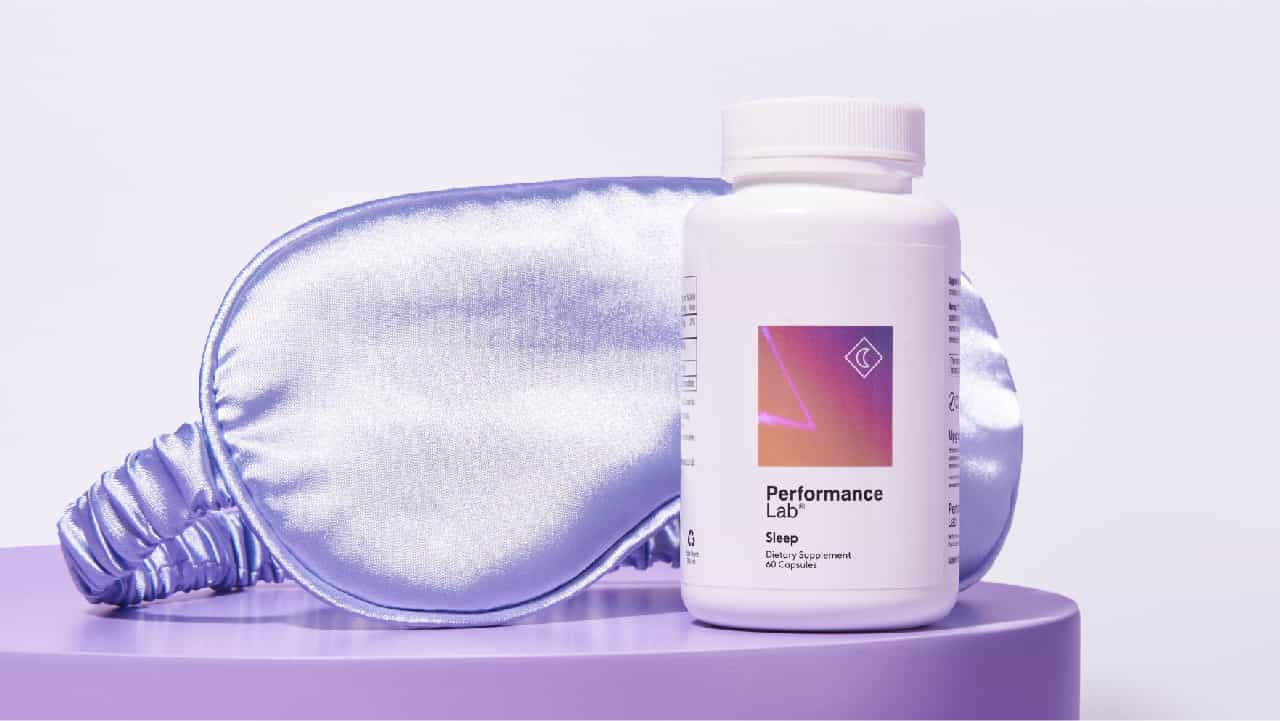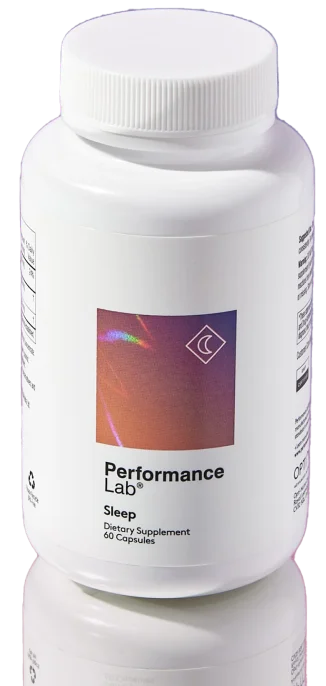Thyroid disease is common. An estimated 20 million Americans are living with some form of thyroid disease right now, with more women than men susceptible.
That figure could also be much higher - the American Thyroid Association estimates that up to 60% of people with thyroid disease are unaware that they have it.
The association also estimates that 12% of the American population will develop a thyroid condition at some point in their lives. (1)
Many will need medication but interest in natural remedies to help them manage their condition and/ or symptoms is growing.
Plant extracts from various medicinal herbs, including lemon balm, are being explored for their potential therapeutic effects on thyroid health and related symptoms.
Such medicinal plants may also be helpful when dealing with the side effects of thyroid issues, such as poor sleep.
Thyroid disease, for instance, often causes issues with sleep onset (how long it takes you to fall asleep), staying asleep, Restless Leg Syndrome, muscle and joint pain, and more.
Which is where lemon balm appears. This perennial herb from the mint family is renowned for its potential sleep-boosting qualities, and is often also researched for its anti-anxiety effects. Both of which can be valuable when dealing with health and thyroid issues.
But is lemon balm safe for thyroid function? Let’s investigate…
Key Takeaways
- Lemon balm is traditionally used for calm and sleep support; some sources discuss thyroid interactions.
- If you have a thyroid condition or take thyroid meds, consult your clinician before use.
- For general relaxation and sleep quality, choose gentle, well-tolerated nighttime formulas.
- Track energy, mood, and sleep metrics to gauge response over 2–4 weeks.

Introduction to Lemon Balm (Melissa Officinalis)

Lemon balm (Melissa officinalis) is a perennial herb belonging to the mint family, celebrated for its gentle lemon scent and long history of use in herbal medicine.
Sometimes called balm mint, the lemon balm plant has been traditionally valued as a calming herb and is now recognized for a wide range of potential health benefits.
The plant’s leaves are rich in essential oils, volatile oils, and phenolic compounds such as rosmarinic acid, which contribute to its soothing and therapeutic effects.
Lemon balm extract and balm mint extract are available in several forms, including dried extract, leaf extract, aqueous extracts, essential oils, and as a general category, plant extract. These preparations are commonly used in natural remedies to address issues like stress, sleep disturbances, and digestive discomfort. (2)
Notably, lemon balm has been studied for its antiviral, anti-inflammatory, and antioxidant properties, making it a popular choice for treating cold sores caused by the herpes simplex virus, as well as for supporting overall immune health. (3, 4)
Recent research has also explored the potential of lemon balm melissa officinalis in managing thyroid disorders. The herb’s unique chemical composition, particularly its rosmarinic acid content, is believed to play a role in modulating thyroid function. More on that in detail later...
Let’s take a brief look at what science has concluded so far about lemon balm’s potential health benefits…
Health Benefits of the Lemon Balm Plant

Several clinical trials have focused on lemon balm and its potential benefits for stress, anxiety, sleep and more. We'll look at its benefits or drawbacks for thyroid in particular later, but for now let's examine its other overall health benefits…
- Stress and anxiety. Studies suggest that lemon balm helps to increase GABA - the neurotransmitter that can calm the nervous system and block hyperactive brain signals. (5)
- Possibly as a result of the influence on GABA, lemon balm has been found to help you fall asleep faster, sleep longer and improve sleep quality. (6, 7)
- A meta-study of numerous studies on lemon balm concluded that it may give support for depressive symptoms. (8)
- Lemon balm contains several phenolic acids, including rosmarinic acid and caffeic acid. These are thought to protect against inflammation and oxidative stress, which can contribute to conditions such as cardiovascular disease, arthritis, Alzheimer’s Disease and more. (9, 10)
- Talking of cardiovascular health, lemon balm may help to stabilize blood pressure, reduce heart palpitations and reduce cholesterol. Most research on this has been seen in animal trials, human trials are needed. (11, 12)
- May help to relieve bloating. (13)
- Studies have shown that taking lemon balm may help to reduce triglyceride levels while also reducing ‘bad’ LDL cholesterol. (14)
- May support mood and cognitive performance. Seven studies concluded that lemon balm may help support either cognitive performance, mood or both in people with dementia. (15)
- A small study of college women in Iran suggested that lemon balm may help to ease PMS symptoms, but more research is needed. (16)
- Topical lemon balm cream has long been used to help heal cold sores, and scientific tests prove it may reduce the pain and support the healing of cold sores. (17)
Could lemon balm extract also offer any benefit to thyroid function or thyroid disease in particular? Let's find out. First, let's familiarise ourselves with the basics...
All about the Thyroid

The thyroid, a small butterfly-shaped gland at the base of your neck, produces thyroid hormone. This hormone controls the way your body's metabolism works, or the way in which your body transforms food into energy.
There are actually two main hormones that collectively make up the thyroid hormone - thyroxine (T4) and triiodothyronine (T3). T4 is mostly inactive and doesn't affect the cells, which is why the body produces T4 but then transforms it to T3, the active form.
Why is the Thyroid Gland So Important?
What does thyroid hormone do and why is it so important? It may be easier to say what it doesn't do. The thyroid hormones T3 and T4 affect every single cell in your body.
They influence your metabolic rate (the way your body uses calories, with subsequent weight gain or weight loss) as well as your body temperature and heart rate.
They also affect brain development, how fast food moves through the digestive tract, the way our muscles contract, and control the rate at which our body replaces (normally) dying cells.
Understanding Thyroid Function

Thyroid hormone production is a multi-layered process, and involves several different elements in the body. In a nutshell...
-
Your hypothalamus, part of your brain, first releases TRH (Thyroid-Releasing Hormone).
-
This then tells the pituitary gland - a gland at the base of the brain and connected to the hypothalamus - to emit TSH (Thyroid-Stimulating Hormone).
-
The TSH hormone then stimulates the thyroid to produce T4 and T3.
-
A feedback loop means that when T4 and T3 increase to adequate amounts, it prevents the release of any more TRH or TSH.
-
When levels of T4 and T3 drop, the whole process begins again, helping to keep adequate amounts of thyroid in the body at all times. (18)
It's a miracle of bodily engineering, isn't it? But it also means that if anything goes wrong with the hypothalamus, pituitary or thyroid gland, it can interfere with thyroid production.
Different Types of Thyroid Disorders
Abnormal thyroid levels can cause several different thyroid disorders or conditions, often categorised under the umbrella of thyroid disease. It is commonly accepted, however, that there are two main types of thyroid disorder....
-
Hypothyroidism or underactive thyroid, when the body doesn't make or release enough thyroid hormone. This can slow down your metabolism, meaning you may feel tired all the time or gain weight. The most common cause of hypothyroidism is Hashimoto's disease, an autoimmune disorder that damages the thyroid gland and reduces levels of thyroid hormone in the body. (19, 20)
-
Hyperthyroidism or overactive thyroid, when the body makes and releases too much thyroid hormone. May speed up your heart rate, appetite, anxiety and more. Approximately 4 out of 5 cases of hyperthyroidism are caused by Graves disease, an autoimmune disease which attacks your thyroid gland, causing it to speed up production of the thyroid hormone. (21, 22)
Lemon Balm and Thyroid Health

Thyroid disorders, such as hypothyroidism and hyperthyroidism, can be treated with medication and lifestyle changes, and some may also consider herbal approaches as a safe and effective treatment . But can a herb such as lemon balm melissa officinalis help, and is it safe to use?
Here's the shortcut lowdown: Lemon balm has been seen to influence thyroid levels in the body. It's for this reason that many medical sites will tell people with thyroid disease to avoid lemon balm altogether.
However, this is a one-size-fits-all approach to the herbal treatment of thyroid health, when in reality it's a little more nuanced than that.
A quick look at forums and discussion boards on the web for thyroid issues reveals people taking traditionally used anxiolytic (anti-anxiety) botanicals such as lemon balm or Valerian root extract to help reduce symptoms of anxiety and help with sleep.
In the interests of being fully informed, let's examine that further.
A Quick Word about Thyroid Issues and Sleep Quality

It's not surprising that people with thyroid disease or thyroid issues are looking for help with their sleep: both overactive and underactive thyroids are linked to sleep problems.
Overactive or hyperthyroidism can make sleeping difficult due to irritability and nervousness, muscle weakness, night sweats and an urge to urinate frequently. None of which is conducive to quality sleep.
Underactive or hypothyroidism may cause muscle or joint pain that disrupts sleep, plus may make it harder to tolerate cold at night. Some studies have linked an underactive thyroid to a longer sleep onset (the time it takes you to fall asleep once in bed), shorter sleep duration and poor quality sleep.
Thyroid disease may also increase the likelihood of developing Restless Leg Syndrome, which often interferes with sleep. (23)
So let's take a scientific look at how this herb from the mint family may influence thyroid hormone production, good and bad...
Potential Benefits of Lemon Balm for Graves Disease and Hyperthyroidism
The British Thyroid Association in the UK references an unnamed study from the 1980s which first posited that lemon balm may help with Graves disease. (24)
Test tube studies have since shown that lemon balm may indeed inhibit Graves autoantibodies. These autoantibodies, also known as thyroid stimulating antibodies, mistakenly target the thyroid gland, mimicking the action of TSH.
As we learnt earlier, TSH - Thyroid Stimulating Hormone - encourages the thyroid to produce more T3 and T4 hormone. Essentially, producing more thyroid hormone than you want.
So - the theory goes - anything which can prevent these autoantibodies from targeting the thyroid gland may reduce the over-production of the thyroid hormone in Graves disease. Potentially helping to keep thyroid hormone levels in check.
The rosmarinic acid within lemon balm is also believed to form a loose bond with TSH, preventing it from interacting with the thyroid gland. (25, 26)
One Egyptian study of 50 rats with induced hypothyroidism given Melissa Officinalis Ethanolic Extract concluded that it helped ameliorate (to reduce or make more tolerable) thyroid function towards normal levels. It did so without any unfavorable effects on the body. (27)
Human Studies on Lemon Balm and Thyroid Function

A more recent report published in the Journal of Endocrine Society in 2021 reported on two women with overactive thyroid who were separately treated with herbal remedies, including lemon balm and bugleweed (Lycopus), a perennial herb. Bugleweed contains active compounds such as caffeic acid, which may contribute to its thyroid-modulating effects.
In the first case, a 64-year-old woman with Graves disease took an herbal combination of lemon balm and bugleweed for nine months. Her thyroid tests both improved and then remained normal, without the need for any other thyroid medication.
In the second case, a 46-year-old woman with thyroid eye disease took a tincture of lemon balm and bugleweed. Her thyroid tests normalized after 15 months taking the tincture. (28)
A different study cites a 27-year-old woman diagnosed with uncontrolled hyperthyroidism (overactive thyroid). The patient had used traditional medication for a year, but without success. Sent to a traditional Persian clinic, she was given specific recommendations to modify her lifestyle, drink Melissa officinalis (lemon balm) tea and Persian barley water.
After two months, levels of her thyroid hormone decreased, and prior issues with anxiety and sleep disturbance were reduced. After one year, the patient’s thyroid function tests were normal, and her condition was stable. (29)
These are promising reports but if you notice, they are individual stories. That’s because very little research has been done on the potential benefits of lemon balm on thyroid disease among humans.
Which is one source of irritation for sufferers who question why more studies haven't followed up the earlier findings about lemon balm and Graves disease.
A Warning about Underactive Thyroid or Hypothyroidism
On that note, it’s important to note that all the reports here only apply to Graves disease and hyperthyroidism or overactive thyroid- and not the opposite. In fact, lemon balm could potentially be dangerous to anyone with underactive thyroid. (Scroll down to see more on the potential risks of lemon balm extract).
And as for clinical conclusions about lemon balm in Graves disease? So far, science agrees that while it may show promise, there is currently insufficient evidence to recommend the use of lemon balm in treating Graves disease. Much more research is needed. (30)
Best Sleep Supplement
* with Lemon Balm.

Performance Lab Sleep aims to support sleep by bringing together four important natural herbs, fruits, minerals and amino acids shown to promote different aspects of sleep health.
It provides a low dose of melatonin, the sleep hormone, courtesy of Montmorency tart cherries. Along with a pre-cursor to melatonin, tryptophan.
It also includes magnesium to help relax muscles before bed.
Please note that it also includes 200mg of lemon balm, traditionally known to support sleep and potentially reduce symptoms of anxiety.


Dietary Considerations for Thyroid Health

It is important to note that there is no special diet, herbs or vitamins that have been proven without a doubt to correct thyroid disease.
In general, a balanced diet with whole foods and at least five fruits and vegetables every day may help to support thyroid health and help to reduce symptoms. Many thyroid patients may be recommended to follow a special diet that avoids foods containing iodine, and to take vitamin D or calcium supplements.
As a general rule, it's advisable to avoid processed foods, reduce sugar, make sure you're eating enough protein, dairy and high fiber starchy foods, and to drink plenty of fluids. (31)
There is growing evidence that diverse gut bacteria may help overall health, so whole foods, legumes, nuts, beans and wholegrains are useful.
Some studies show that magnesium deficiency may be linked to hypothyroidism and increasing levels can potentially help with Graves disease, but the data is considered inconclusive so far.
You may see kelp and sea moss promoted for their thyroid-boosting effects, but both are high in iodine so are best avoided if you have thyroid disease. (32)
Potential Risks of Lemon Balm
This article wouldn't be complete if I didn't also discuss the potential risks of lemon balm, especially on thyroid function...
On Thyroid Function...

If you're considering lemon balm as part of your wellness routine, it’s important to be aware of its potential interactions with medications, especially those related to thyroid health.
As we discussed, lemon balm contains active compounds like rosmarinic acid that may influence thyroid hormone production and affect levels of thyroid stimulating hormone (TSH).
For individuals with autoimmune thyroid disease—such as Graves’ disease or Hashimoto’s thyroiditis—taking lemon balm supplements could alter thyroid function and potentially interfere with prescribed treatments.
To summarise, we know, for instance, that lemon balm may:
-
Reduce thyroid hormone levels
-
Alter thyroid function
-
Potentially interfere with thyroid medications and hormone replacement therapy.
-
Potentially interfere with thyroid function tests. (33)
It is for this reason that most scientific journals or websites tell people to avoid taking lemon balm if they have thyroid issues.
Because of these potential interactions, it is essential to consult with a healthcare professional before taking lemon balm or any other herbal medicine if you have a history of thyroid disease or are currently on thyroid medications.
General Side Effects of Lemon Balm
Thyroid issues aside, it should be said that lemon balm has been used safely by most people for centuries. It is also on the FDA's Generally Recognised as Safe (GRAS) list. (34)
However, it may cause side effects, especially if used in very high doses. They include wheezing, dizziness, nausea, vomiting, diarrhea, headache, and may irritate the skin in some people if used topically.
Most side effects are mild and temporary. Some people may also be hypersensitive or allergic to lemon balm, though that is rare. Lemon balm may also have a sedative effect. (35)
Other Contraindications of Lemon Balm
Melissa officinalis may also interact with certain medications, such as thyroid medications as mentioned above, as well as SSRIs, sedatives, and HIV medications.(36)
Pregnant or breastfeeding women should exercise caution when using lemon balm or other herbal extracts.
Final Thoughts
While studies suggest that lemon balm may offer anti-inflammatory properties and benefits for conditions like cold sores and sleep disorders, much remains to be learned about its effects on thyroid health.
There is growing interest in the potential of lemon balm for managing autoimmune thyroid disease and Graves’ disease, but current evidence is limited and largely based on small studies or individual case reports.
We would welcome future research based on well-designed clinical trials to better understand how lemon balm and its active compounds - such as rosmarinic acid and caffeic acid - affect thyroid function and interact with thyroid medications.
References
- General Information/ Press Room, American Thyroid Association, https://www.thyroid.org/media-main/press-room/
- Assessment report on Melissa officinalis L., folium, European Medicines Agency, 2013 https://www.ema.europa.eu/en/documents/herbal-report/final-assessment-report-melissa-officinalis-l-folium_en.pdf
- “Melissa officinalis Linn.” In Indian Medicinal Plants: An Illustrated Dictionary, edited by C. P. Khare, pp 406-407. Springer. (2007) https://link.springer.com/rwe/10.1007/978-0-387-70638-2_995
- Natalka Roshak, AB, Lemon Balm, Examine.com, https://examine.com/supplements/lemon-balm/
- Gamma-Aminobutyric Acid (GABA), Cleveland Clinic, https://my.clevelandclinic.org/health/articles/22857-gamma-aminobutyric-acid-gaba
- Aliakbari, Fatemeh Alesaeidi, Samira. (2018). The effectiveness of Melissa officinalis on sleep problem in patients with chronic heart failure. Journal of Pharmaceutical Negative Results. 9. 55. 10.4103/jpnr.JPNR_16_17.
- Haybar H, Javid AZ, Haghighizadeh MH, Valizadeh E, Mohaghegh SM, Mohammadzadeh A. The effects of Melissa officinalis supplementation on depression, anxiety, stress, and sleep disorder in patients with chronic stable angina. Clin Nutr ESPEN. 2018 Aug;26:47-52. doi: 10.1016/j.clnesp.2018.04.015. Epub 2018 May 19. PMID: 29908682.
- Ghazizadeh J, Sadigh-Eteghad S, Marx W, Fakhari A, Hamedeyazdan S, Torbati M, Taheri-Tarighi S, Araj-Khodaei M, Mirghafourvand M. The effects of lemon balm (Melissa officinalis L.) on depression and anxiety in clinical trials: A systematic review and meta-analysis. Phytother Res. 2021 Dec;35(12):6690-6705. doi: 10.1002/ptr.7252. Epub 2021 Aug 27. PMID: 34449930.
- Miraj S, Rafieian-Kopaei, Kiani S. Melissa officinalis L: A Review Study With an Antioxidant Prospective. J Evid Based Complementary Altern Med. 2017 Jul;22(3):385-394. doi: 10.1177/2156587216663433. Epub 2016 Sep 11. PMID: 27620926; PMCID: PMC5871149. https://pmc.ncbi.nlm.nih.gov/articles/PMC5871149/#section11-2156587216663433
- Tóth, Jaroslav & Mrlianová, Mária & Tekeľová, Daniela & Koreňová, Marcela. (2003). Rosmarinic acid – an important phenolic active compound of lemon balm (Melissa officinalis L.). Acta Facultatis Pharmaceuticae Universitatis Comenianae. 50. 139-146.
- Draginic N, Jakovljevic V, Andjic M, Jeremic J, Srejovic I, Rankovic M, Tomovic M, Nikolic Turnic T, Svistunov A, Bolevich S, Milosavljevic I. Melissa officinalis L. as a Nutritional Strategy for Cardioprotection. Front Physiol. 2021 Apr 22;12:661778. doi: 10.3389/fphys.2021.661778. PMID: 33967832; PMCID: PMC8100328.
- Ahmad Beik, Siyavash Joukar, Hamid Najafipour, A review on plants and herbal components with antiarrhythmic activities and their interaction with current cardiac drugs, Journal of Traditional and Complementary Medicine, Volume 10, Issue 3, 2020, Pages 275-287, ISSN 2225-4110, https://doi.org/10.1016/j.jtcme.2020.03.002. (https://www.sciencedirect.com/science/article/pii/S2225411020300754)
- What Is Lemon Balm Good For? Cleveland Clinic, https://health.clevelandclinic.org/lemon-balm-benefits
- Shahsavari K, Shams Ardekani MR, Khanavi M, Jamialahmadi T, Iranshahi M, Hasanpour M. Effects of Melissa officinalis (lemon balm) consumption on serum lipid profile: a meta-analysis of randomized controlled trials. BMC Complement Med Ther. 2024 Apr 4;24(1):146. doi: 10.1186/s12906-024-04442-0. PMID: 38575930; PMCID: PMC10996117.
- Noriko Shinjyo, Julia Green, Are sage, rosemary and lemon balm effective interventions in dementia? A narrative review of the clinical evidence, European Journal of Integrative Medicine, Volume 15, 2017, Pages 83-96, ISSN 1876-3820, https://doi.org/10.1016/j.eujim.2017.08.013. (https://www.sciencedirect.com/science/article/pii/S187638201730149X)
- Does lemon balm help with PMS symptoms? Examine.com, https://examine.com/faq/does-lemon-balm-help-with-pms-symptoms/#ref-3
- Natalka Roshak, AB, Have any supplements been studied for cold sores? Examine.com, https://examine.com/faq/have-any-supplements-been-studied-for-cold-sores/
- Thyroid Hormone, Cleveland Clinic, https://my.clevelandclinic.org/health/articles/22391-thyroid-hormone
- Hashimoto's Disease, National Institute of Diabetes and Digestive and Kidney Diseases, https://www.niddk.nih.gov/health-information/endocrine-diseases/hashimotos-disease
- Hypothyroidism (Underactive Thyroid), Cleveland Clinic, https://my.clevelandclinic.org/health/diseases/12120-hypothyroidism
- Hyperthyroidism, Cleveland Clinic, https://my.clevelandclinic.org/health/diseases/14129-hyperthyroidism
- Akram S, Elfenbein DM, Chen H, Schneider DF, Sippel RS. Assessing American Thyroid Association guidelines for total thyroidectomy in Graves’ disease. Journal of Surgical Research. 2020;245:64–71. doi: 10.1016/j.jss.2019.07.029
- Thyroid Issues and Sleep, The Sleep Foundation. https://www.sleepfoundation.org/physical-health/thyroid-issues-and-sleep#
- Diets and supplements for thyroid disorders, British Thyroid Foundation, https://www.btf-thyroid.org/diets-and-supplements-for-thyroid-disorders#_edn6
- Santini F, Vitti P, Ceccarini G, Mammoli C, Rosellini V, Pelosini C, Marsili A, Tonacchera M, Agretti P, Santoni T, Chiovato L, Pinchera A. In vitro assay of thyroid disruptors affecting TSH-stimulated adenylate cyclase activity. J Endocrinol Invest. 2003 Oct;26(10):950-5. doi: 10.1007/BF03348190. PMID: 14759065.
- Auf’mkolk M, Ingbar JC, Kubota K, Amir SM, Ingbar SH. Extracts and auto-oxidized constituents of certain plants inhibit the receptor-binding and the biological activity of Graves’ immunoglobulins. Endocrinology. 1985 May;116(5):1687-93. doi: 10.1210/endo-116-5-1687. PMID: 2985357.
- Abdel-Aziz, M. (2018). STUDY ON THE THERAPEUTIC POTENTIAL OF MELISSA OFFICINALIS (LEMON BALM) ON MALE WISTAR ALBINO RATS WITH INDUCED-HYPOTHYROIDISM. Al-Azhar Journal of Pharmaceutical Sciences, 57(1), 1-17. doi: 10.21608/ajps.2018.46618
- Kaplan D, Dosiou C. Two Cases of Graves’ Hyperthyroidism Treated With Homeopathic Remedies Containing Herbal Extracts from Lycopus spp. and Melissa officinalis. J Endocr Soc. 2021 May 3;5(Suppl 1):A971. doi: 10.1210/jendso/bvab048.1984. PMCID: PMC8090196.
- Parvizi MM, Foolad S, Zeighami A, Namazi MR, Heydari M. Successful Maintenance Treatment of a Patient with Resistant Hyperthyroidism with Traditional Persian Medicine Recommendations: A Case Report and Literature Review. Complement Med Res. 2024;31(6):572-576. English. doi: 10.1159/000541255. Epub 2024 Sep 5. PMID: 39236697.
- Katie Welch, Herbs for Potential Adjunct Treatment of Thyroid Disease A Review of Botanical Preparations for Hypo- and Hyperthyroidism, Thyroid Nodules, and Thyroid Cancer. American Botanical Council, ISSUE: 79, Page: 52-65, https://www.herbalgram.org/resources/herbalgram/issues/79/table-of-contents/article3314/
- Complementary and Alternative Medicine (CAM) in Thyroid Disease, American Thyroid Association https://thyroid.org/wp-content/uploads/patients/brochures/CAM_brochure.pdf
- Diets and supplements for thyroid disorders, British Thyroid Association, https://www.btf-thyroid.org/diets-and-supplements-for-thyroid-disorders#
- Lemon Balm - Uses, Side Effects, and More, WebMD, https://www.webmd.com/vitamins/ai/ingredientmono-437/lemon-balm#overview
- Draginic N, Jakovljevic V, Andjic M, Jeremic J, Srejovic I, Rankovic M, Tomovic M, Nikolic Turnic T, Svistunov A, Bolevich S, Milosavljevic I. Melissa officinalis L. as a Nutritional Strategy for Cardioprotection. Front Physiol. 2021 Apr 22;12:661778. doi: 10.3389/fphys.2021.661778. PMID: 33967832; PMCID: PMC8100328.
- Health Benefits of Lemon Balm, Healthline, https://www.healthline.com/health/lemon-balm-uses#side-effects-and-risks
- Lemon Balm, Examine.com, https://examine.com/supplements/lemon-balm














